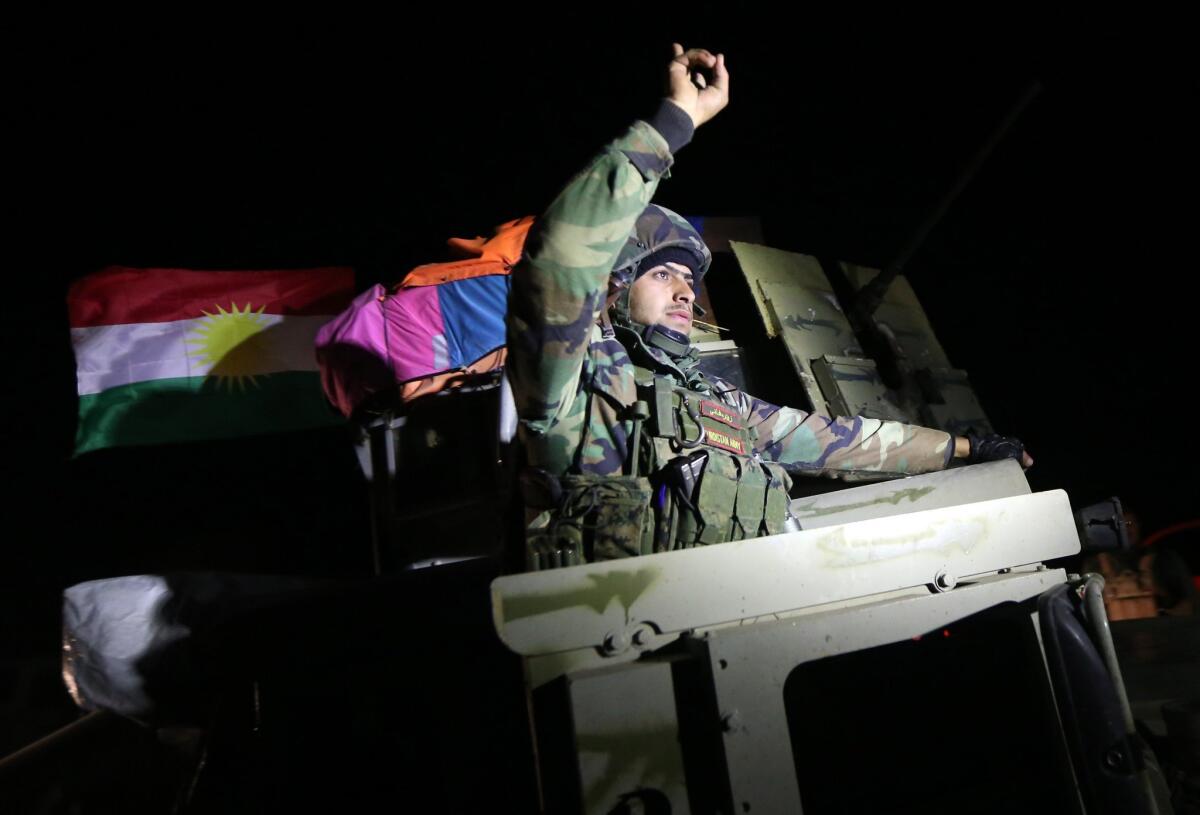Kurdish fighters enter Islamic State-occupied town of Sinjar

Reporting from Baghdad â Kurdish fighters backed by U.S.-led coalition airstrikes on Sunday entered the northern Iraqi town of Sinjar, which has been held by Islamic State militants for months.
The campaign to retake the mountain town is the latest effort to regain ground lost to the Sunni extremist group during the summer, when it expanded from strongholds in neighboring Syria and seized large swaths of northern and western Iraq.
So far in Sinjar, Kurdish peshmerga fighters have managed to clear a path to the mountain that overshadows town, allowing some of the thousands of Yazidis, a religious minority, trapped there since summer to evacuate.
That meant clearing mines and roadside bombs planted by Islamic State, which they continued to do Sunday in an area covering more than 800 square miles, according to a statement from the Kurdistan regional governmentâs security council.
The council posted video of residents returning to their homes via the newly cleared road and praising both the airstrikes and the Kurdish fighters for fending off Islamic State, known in Arabic as Daesh.
âThe whole world comes and goes through this road. The way has become safe now, there are no longer any Daesh here,â says a man in the video, wearing a leather jacket and standing near a car with several other people. âWeâre back in our village again. Thanks be to God the peshmerga triumphed over the whole village, there is no longer any Daesh here. They all fled from here and were defeated.â
According to the council, airstrikes and the peshmerga have killed at least 250 Islamic State militants since the offensive started Wednesday, including 50 in Sinjar on Saturday.
The spokesman for Kurdish forces said Sunday that the fighters in Sinjar were still facing resistance from the militants.
âWe have the city surrounded from all sides,â said spokesman Jabar Yawar, âbut the Daesh terrorists are in the houses and they are fighting us from there. The operation is ongoing but has not ended.â
The president of the semiautonomous Kurdish region of northern Iraq, Massoud Barzani, toured Kurdish positions on Mt. Sinjar on Sunday, where he vowed to defeat the militants.
âAny place we can find them, we will crush the Islamic State,â he told the BBC.
Three weekend airstrikes also hit Tall Afar, home to a military airport east of Sinjar near the Syrian border that Iraq has been trying to wrest from Islamic State control. The aerial attack targeted, among other sites, a building, checkpoint and six vehicles, according to a U.S. military statement.
In addition, strikes targeted areas near the northern city of Mosul, captured by Islamic State in June; the desert hamlet of Rutba; and Baiji, a refinery town.
In Syria, the U.S.-led coalition carried out at least five airstrikes over the weekend near Kobani, a city near the Turkish border, destroying eight Islamic State fighting positions, according to the U.S. military.
The Syrian Observatory for Human Rights, a pro-opposition network based in Britain, claimed that the coalition also had launched at least a dozen airstrikes against Islamic State-controlled towns in the northern Syrian province of Aleppo, where rebels and Al Qaeda-linked groups fighting the Syrian government also have been battling the extremist movement for months.
New insight into Islamic State is expected this week from a German journalist working on a book about the group who recently spent 10 days living with the extremists in Mosul, documenting their regime.
Juergen Todenhoefer, 74, posted images on his Facebook page purportedly taken during the visit, and told the German website Der tz that he plans to publish a summary of his trip on Monday.
Todenhoefer described Islamic State as âmuch stronger than we think,â fueled by âan almost ecstatic enthusiasm that I have never encountered in any other war zoneâ â including interviews with Al Qaeda and the Taliban.
âEach day, hundreds of willing fighters arrive from all over the world,â he told the website about his time in Mosul. He said that the militants are spread out across the city and that airstrikes by the U.S.-led coalition will probably fail to beat them.
âWith every bomb that is dropped now and meets a civilian, the number of terrorists is increased,â he said.
Times staff writer Hennessy-Fiske reported from Baghdad and special correspondent Bulos from Beirut.
Twitter: @mollyhf
More to Read
Sign up for Essential California
The most important California stories and recommendations in your inbox every morning.
You may occasionally receive promotional content from the Los Angeles Times.










